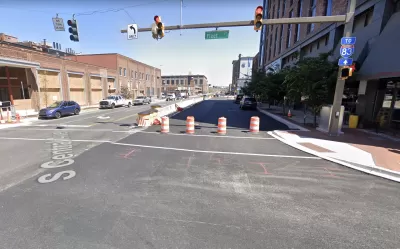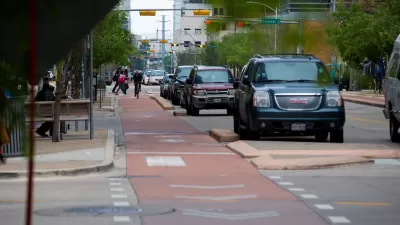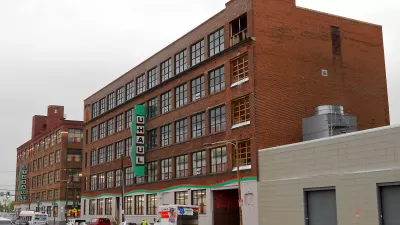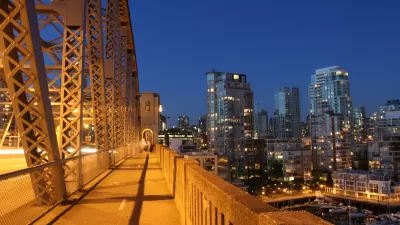Residents and business operators say they weren’t warned about a road diet planned for a major thoroughfare in Baltimore. Planners and advocates say the changes have been a long time coming.

“Work is wrapping up on a $55 million, yearslong upgrade of a major downtown roadway serving Baltimore’s developing waterfront neighborhoods,” reports Lorraine Mirabella in a paywalled article for the Baltimore Sun. “But the revitalization of Central Avenue’s streetscape has surprised some business operators and residents.”
Based on the article’s telling of the story, some local businesses and residents were expecting the project to add vehicle capacity—instead the project is eliminating a vehicle lane in each direction and adding a protected bicycle path. Doug Schmidt, a principal with Workshop Development, is quoted in the article saying the “road diet” was never made public.
“Opponents fear the rebuilt road won’t handle current traffic or heavier use as workers return to offices and as new apartments, offices, hotels and stores open in the corridor. They worry about safety, loss of parking, disruption to businesses that rely on loading areas and increased congestion on neighborhood streets,” writes Mirabella.
Proponents, including bike and complete streets advocates, support the changes. The article notes that the political conflict is indicative of similar struggles in other cities—where increasing awareness of traffic safety and climate change is butting heads with the car-centric planning status quo.
The article documents the planning process that produced the road diet for Central Avenue. The process dates back to 2015, with more direct changes implemented by the city’s adoption of a complete streets ordinance in 2018 and public outreach in November 2021.
FULL STORY: Controversy emerges over changes to Baltimore’s Central Avenue streetscape as it nears completion

Alabama: Trump Terminates Settlements for Black Communities Harmed By Raw Sewage
Trump deemed the landmark civil rights agreement “illegal DEI and environmental justice policy.”

Study: Maui’s Plan to Convert Vacation Rentals to Long-Term Housing Could Cause Nearly $1 Billion Economic Loss
The plan would reduce visitor accommodation by 25% resulting in 1,900 jobs lost.

Planetizen Federal Action Tracker
A weekly monitor of how Trump’s orders and actions are impacting planners and planning in America.

Waymo Gets Permission to Map SF’s Market Street
If allowed to operate on the traffic-restricted street, Waymo’s autonomous taxis would have a leg up over ride-hailing competitors — and counter the city’s efforts to grow bike and pedestrian on the thoroughfare.

Parklet Symposium Highlights the Success of Shared Spaces
Parklets got a boost during the Covid-19 pandemic, when the concept was translated to outdoor dining programs that offered restaurants a lifeline during the shutdown.

Federal Homelessness Agency Places Entire Staff on Leave
The U.S. Interagency Council on Homelessness is the only federal agency dedicated to preventing and ending homelessness.
Urban Design for Planners 1: Software Tools
This six-course series explores essential urban design concepts using open source software and equips planners with the tools they need to participate fully in the urban design process.
Planning for Universal Design
Learn the tools for implementing Universal Design in planning regulations.
Caltrans
Smith Gee Studio
Institute for Housing and Urban Development Studies (IHS)
City of Grandview
Harvard GSD Executive Education
Toledo-Lucas County Plan Commissions
Salt Lake City
NYU Wagner Graduate School of Public Service





























